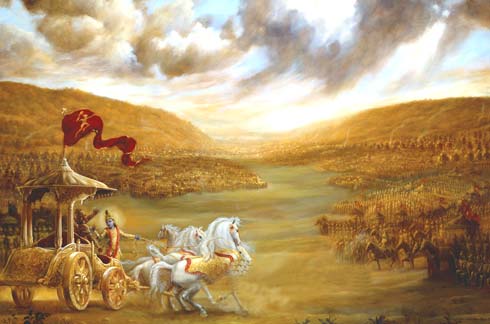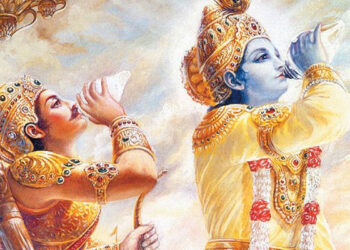TEXT 47
karmaṇy evādhikāras te
mā phaleṣu kadācana
mā karma-phala-hetur bhūr
mā te saṅgo ‘stv akarmaṇi
SYNONYMS
karmaṇi—in prescribed duties; eva—certainly; adhikāraḥ—right; te—of you; mā—never; phaleṣu—in the fruits; kadācana—at any time; mā—never; karma-phala—in the result of the work; hetuḥ—cause; bhūḥ—become; mā—never; te—of you; saṅgaḥ—attachment; astu—there should be; akarmaṇi—in not doing prescribed duties.
TRANSLATION
You have a right to perform your prescribed duty, but you are not entitled to the fruits of action. Never consider yourself the cause of the results of your activities, and never be attached to not doing your duty.
PURPORT
There are three considerations here: prescribed duties, capricious work, and inaction. Prescribed duties are activities enjoined in terms of one’s acquired modes of material nature. Capricious work means actions without the sanction of authority, and inaction means not performing one’s prescribed duties. The Lord advised that Arjuna not be inactive, but that he perform his prescribed duty without being attached to the result. One who is attached to the result of his work is also the cause of the action. Thus he is the enjoyer or sufferer of the result of such actions.
As far as prescribed duties are concerned, they can be fitted into three subdivisions, namely routine work, emergency work and desired activities. Routine work performed as an obligation in terms of the scriptural injunctions, without desire for results, is action in the mode of goodness. Work with results becomes the cause of bondage; therefore such work is not auspicious. Everyone has his proprietary right in regard to prescribed duties, but should act without attachment to the result; such disinterested obligatory duties doubtlessly lead one to the path of liberation.
Arjuna was therefore advised by the Lord to fight as a matter of duty without attachment to the result. His nonparticipation in the battle is another side of attachment. Such attachment never leads one to the path of salvation. Any attachment, positive or negative, is cause for bondage. Inaction is sinful. Therefore, fighting as a matter of duty was the only auspicious path of salvation for Arjuna.
TEXT 48
yoga-sthaḥ kuru karmāṇi
saṅgaṁ tyaktvā dhanañjaya
siddhy-asiddhyoḥ samo bhūtvā
samatvaṁ yoga ucyate
SYNONYMS
yoga-sthaḥ—equipoised; kuru—perform; karmāṇi—your duties; saṅgam—attachment; tyaktvā—giving up; dhanañjaya—O Arjuna; siddhi-asiddhyoḥ—in success and failure; samaḥ—equipoised; bhūtvā—becoming; samatvam—equanimity; yogaḥ-yoga; ucyate—is called.
TRANSLATION
Perform your duty equipoised, O Arjuna, abandoning all attachment to success or failure. Such equanimity is called yoga.
PURPORT
Kṛṣṇa tells Arjuna that he should act in yoga. And what is that yoga? Yoga means to concentrate the mind upon the Supreme by controlling the ever-disturbing senses. And who is the Supreme? The Supreme is the Lord. And because He Himself is telling Arjuna to fight, Arjuna has nothing to do with the results of the fight. Gain or victory are Kṛṣṇa’s concern; Arjuna is simply advised to act according to the dictation of Kṛṣṇa. The following of Kṛṣṇa’s dictation is real yoga, and this is practiced in the process called Kṛṣṇa consciousness. By Kṛṣṇa consciousness only can one give up the sense of proprietorship. One has to become the servant of Kṛṣṇa, or the servant of the servant of Kṛṣṇa [Cc. Madhya 13.80]. That is the right way to discharge duty in Kṛṣṇa consciousness, which alone can help one to act in yoga.
Arjuna is a kṣatriya, and as such he is participating in the varṇāśrama-dharma institution. It is said in the Viṣṇu Purāṇa that in the varṇāśrama-dharma, the whole aim is to satisfy Viṣṇu. No one should satisfy himself, as is the rule in the material world, but one should satisfy Kṛṣṇa. So unless one satisfies Kṛṣṇa, one cannot correctly observe the principles of varṇāśrama-dharma. Indirectly, Arjuna was advised to act as Kṛṣṇa told him.



















